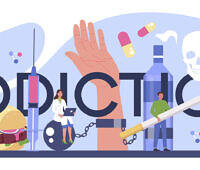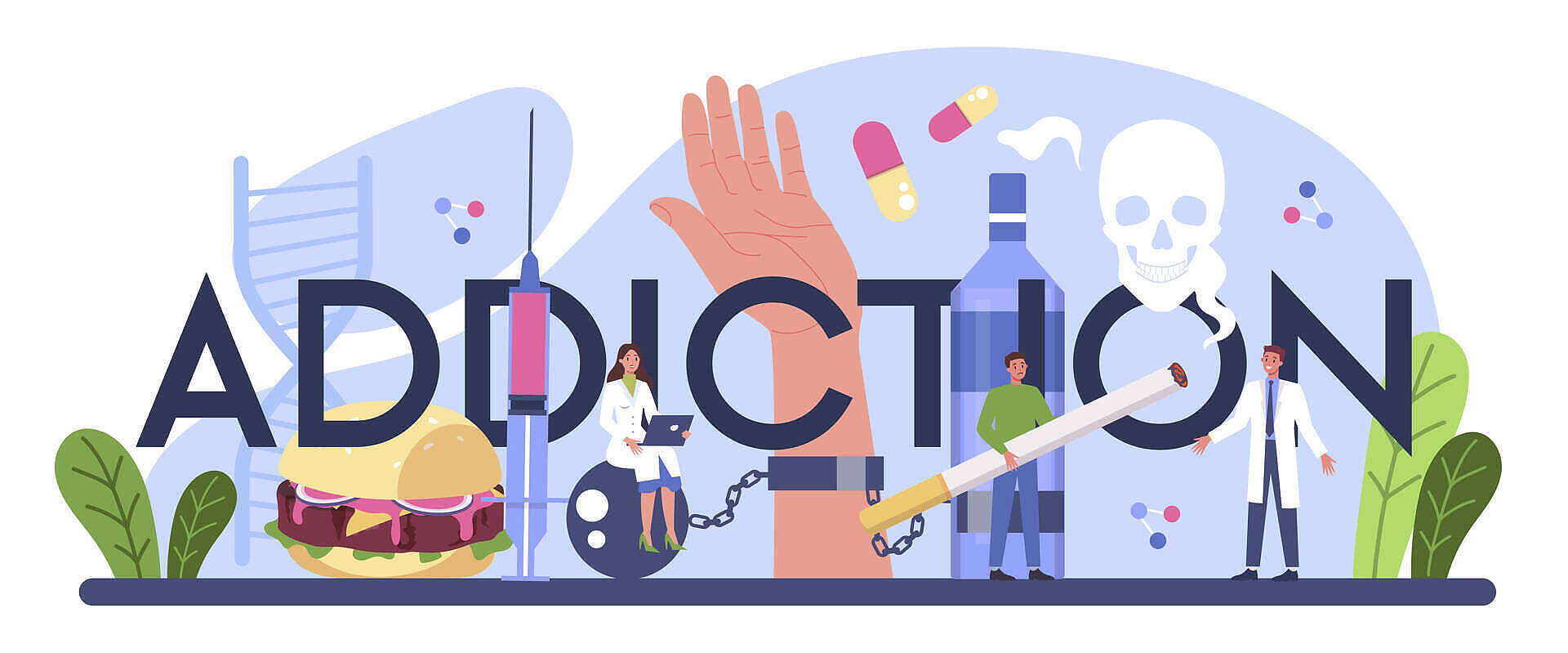
What Are The Most Addictive Drugs?

With drug addiction on the rise, more and more people are asking what are the most addictive drugs. It is well worth knowing which drugs are the most addictive as the answer is surprising. You can also learn how drug addiction occurs, who is most at risk and what to do if you think you or a loved one has a problem with one of these drugs.
Many drugs have the potential to be habit-forming, yet some substances have a dangerously high potential for abuse. These drugs are not only physically addictive but also psychologically addictive. Furthermore, many of them are easily accessible, and some are even prescribed.
Most people will experiment with substances at some point in their lives, usually in their teenage years. Whilst the majority will leave it at experimentation, a few will continue to abuse substances and go on to develop a full-blown addiction.
Here, we look at the top 4 most addictive drugs available and why, for some people, addiction develops.
Our top 4 most addictive drugs
Some drugs are more addictive than others. This is due to either their ease of availability, their psychological addictiveness or their tolerance-building properties. However, taking these drugs doesn’t necessarily mean you will develop an addiction. On the other hand, repeated abuse of them does put you at much higher risk.
Alcohol
Alcohol is readily available and hard to avoid. It is also much more accessible than other drugs to the younger generation at the highest risk of developing an addiction. This is backed up by statistics reported in 2016, confirming that 23% of 15-year-olds admitted to having been drunk in the past month. This is despite the legal age of drinking alcohol in the UK being 18 years old.
Alcohol abuse is reported to be the biggest risk factor for death, ill health and disability among 15-49 year-olds in the UK. It is the fifth biggest risk factor for death across all ages.
In the UK, there were 8,974 deaths registered from alcohol-specific causes in 2020. This is an 18.6% increase when compared with 2019. Furthermore, 77% of alcohol-specific deaths were caused by alcoholic liver disease. What this shows is that the vast majority of people in the UK who have died from alcohol have abused it to the point of developing a life-threatening liver condition.
So what makes alcohol our top most addictive drug? Simply put, the majority of people who seek treatment for a substance abuse problem do so for alcohol. Alcohol is socially accepted and encouraged, but it can also be habit-forming and cause dependence and withdrawal. Sadly, nearly 80% of people with an alcohol use disorder do not seek treatment, which may well explain why alcohol-related deaths are so high.

Cocaine
Cocaine is a powerful stimulant derived from the coca plant, which is native to South America. It can be manufactured illegally in either powder or rock form (known as crack cocaine). Cocaine has a high potential for abuse and addiction.
Powdered cocaine is typically administered through snorting, smoking, or injection. Crack cocaine is usually smoked but can also be injected. The consumption of cocaine leads to a sudden increase in dopamine levels in the brain, which is responsible for producing pleasure. The effects of this drug are quick in onset and intense, yet short-lived.
The Drug Enforcement Administration (DEA) report that cocaine is one of the most addictive drugs and is often abused in a pattern of binge use.
Binging on cocaine involves taking multiple doses of the drug, back to back, with the intention of remaining “high”. Once the effects of cocaine wear off, there is a huge“crash” in dopamine levels in the brain. The comedown effects of cocaine can cause physical and mental fatigue, depression, and intense cravings for more cocaine.
The physical and mental comedown effects of cocaine, combined with the intense euphoria it produces, make cocaine one of the most addictive drugs available. After cannabis, cocaine is the second most widely used drug in the UK.
Heroin and Opioids
Whilst Heroin is well known for leading to addiction, opioids are a key ingredient in a vast number of prescription painkillers.
Prescription painkillers that contain highly addictive opioid drugs include (but are not limited to):
Opioids initiate a pronounced euphoric high that is long-lasting. However, they quickly build tolerance and dependence, known factors that can lead to addiction. Heroin and opioids can have you hooked in as little as 3 to 5 days of continuous use. The stronger the opioid, the more addictive it is and the worse the withdrawals are.
Almost half of all drug-related deaths reported involve an opiate of some kind.
Opioids are easy to overdose on as they suppress a person’s respiratory system. Overdose frequently happens by accident when a person takes more opioids than their body is used to, a stronger kind of opioid, or mixes opioids with other depressant drugs such as alcohol or benzodiazepines.
Heroin and morphine are responsible for the most opioid-related deaths. However, it is important to note that Heroin is converted into morphine once ingested and processed by the body.
Heroin is one of the most addictive Class A drugs around. Withdrawals from heroin can be so distressing and uncomfortable that a person continues to use the drug, even when they want to stop.

Cannabis
Since estimates began in the year ending December 1995, cannabis has consistently been the most used addictive drug in England and Wales. These statistics are echoed globally. Cannabis is also often mixed with tobacco which can make it dually addictive.
Many people (usually those that use cannabis) will argue that cannabis is not addictive. Whilst for some people this may be true, others do form a physical and psychological dependence on it. However, there is no denying that it is widely used, and for some people, this exposure can be problematic.
Cannabis, weed, pot, skunk and synthetic cannabinoids that are unregulated often have large amounts of THC added. It is the THC in cannabis products that has psychoactive properties. Any psychoactive drugs that are abused regularly have the ability to become habit-forming, build tolerance and result in addiction.
Cannabis use has been associated with intensified feelings of anxiety, panic, and paranoia. Additionally, it is known to increase the risk of mental health issues and addiction among teenage users. Furthermore, it may also increase the risk of psychosis in certain people. Psychosis is characterised by delusional beliefs or hallucinations that are not rooted in reality.
Research has demonstrated a link between marijuana consumption and an increased risk of psychiatric conditions, such as schizophrenia, depression, anxiety, and substance abuse disorders.
A final word on the most addictive drugs
When considering which drugs are most addictive, we have taken into account the availability and use of substances. There are other drugs that are known to be incredibly addictive but are more difficult to get hold of in certain areas. For example, Crystal Methamphetamine is a drug that quickly grips its users and is not one to be dabbled with. The same can be said of certain stimulant prescription drugs and synthetic cannabinoids, which are widely abused.
If you or a loved one have a problem with any drug and are struggling to stop, help is available. Call or message us for a free and confidential assessment.
We have many accredited rehabs, treatments, counselling services and detox clinics covering all locations. Following an in-depth telephone assessment, we will make appropriate treatment recommendations according to your needs, location and budget. We will ensure that you get the right treatment to set you up for long-term recovery.
References:
- Smoking, Drinking and Drug Use among Young People in England 2018 [NS]
- The public health burden of alcohol: evidence review updated 2018
- Alcohol-specific deaths in the UK: registered in 2020
- National Institute on Drug Abuse. (2021, April). Cocaine drug facts.
- Deaths related to drug poisoning in England and Wales: 2021 registrations
- Drug misuse in England and Wales: year ending June 2022
- Is there a link between marijuana use and psychiatric disorders?

